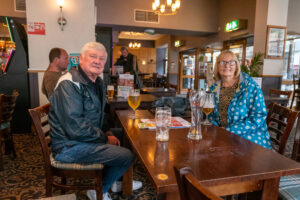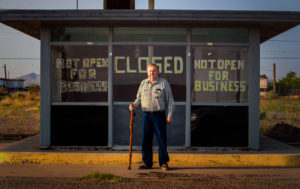Until I walked across England, from Liverpool to Hull, I’d never heard of Wetherspoon. I certainly had no idea that, as a well-educated person, I was supposed to be scornful of the chain of pubs. When I discovered it, I liked it, for the same simple reasons that everyone I met in a Wetherspoon liked it: they are almost always open; have absurdly inexpensive, great beer; and are inviting spaces filled with interesting people who like to talk.
The first Wetherspoon I went into was The Cherry Tree in Huddersfield, to hide from a morning rain shower. Even at 10.30am, it was buzzing. At first glance, it appeared to be filled with more outwardly broken people per square foot than almost anywhere I’ve been in the world: alcoholics (functioning and not), people with disabilities (mental or physical), and the very poor. If I were that way inclined, I could easily paint it as a scene to be gawked at, mocked, pitied, or all three. I could make a clown of the perfectly and precisely dressed bald gentleman who sat four tables down from me, alone, staring straight ahead, sipping his pints and periodically lifting up his tie to lick off the drops that fell on it. Yet as I sheltered in The Cherry Tree, what I saw in him, and beyond him, were hundreds of warm, human and moving scenes of otherwise lonely people not being alone.
The table directly next to mine catered to an evolving mix of mostly elderly people who seemed to all know each other. They would come, hug, sit, sip, gossip, get up, hug again, then move on. It ebbed and flowed like that through lunchtime, until by 2.00pm the table sat only a single couple, across from each other. They eventually invited me to join them. When they introduced themselves, they explained they were not a couple. Not like that, you see. Just friends, drawn a little closer now, because each had recently lost their spouse, and they were more alone than they’d ever been.
She had lost her Oliver eight months before, after 53 years of marriage. He was everything to her, and her to him. Oliver had been a builder, she had been a dinner lady, and after they raised a family, they retired to live their dream of travelling the world. Nashville, Italy, Spain, Vegas. Then he passed away. She tried to tell me more, but kept teetering on the edge of tears.
Her tablemate, a retired military man, had a similar story, although instead of tears there was a measured stoicism. A lost spouse of 22 years, and now confusion. Life wasn’t supposed to be lived without her.
So, they both came to The Cherry Tree daily, to forget and connect. We talked for two beers, and they tried, with all they had left, to keep the conversation positive — even though Huddersfield isn’t what it used to be, the world’s become crueller, and everything is going down the gutter. You have to make the best of the ups, and weather the downs, and focus on the grandkids.

It was an eerily similar conversation to one I’d once had with two widowers in McDonald’s outside of Houston, Texas: a conversation that had helped me to see the fast-food chain not as the soulless corporation to look down on, but as an essential part of local communities, especially “downscale ones”. A welcoming space in a world that’s becoming ever colder and more mechanical. Society needs these inexpensive, judgement-free zones, for people who are used to being judged; places where those of any race, class or age can get together simply to be together; where someone can escape loneliness and the elements, and sit all day in a quiet corner, reading the paper.
After The Cherry Tree, I would go into a Wetherspoon whenever I was near one, and I came to respect them even more than I respect McDonald’s. Partly because they are so pleasant: there is no blasting music or blinding lights. They have comfortable chairs with actual fabric. They are thoughtful, too, with separate spaces for every type of customer, from large families with rambunctious toddlers to sullen singles wanting to bond only with their pint. The employees are polite, which puts the customers on their best behaviour, even those who’ve been drinking for hours straight. I’ve now been to over 40 Wetherspoons, in all parts of the UK, and there are no clunkers.
It is easy to take those things for granted, if you are well-off. But Wetherspoons are also beautiful. Other large chains aim to be dull in their consistency, but every Wetherspoon is unique. With rare exceptions — The Cherry Tree being one of them — each one is in a refurbished historical space, done up in neither a gaudy nor a sterile fashion, honouring the past while keeping it alive in the present. The preservation spirit alone ought to make cultured people gush about Wetherspoons, but, as I quickly learned, when I did gush about them, few gushed back. In fact, they tended to be downright scornful. I learned that I wasn’t supposed to love Wetherspoon, except perhaps ironically, because the chain is “problematic” with an owner “who’s a closed-minded arse”, who supported Brexit and “was wrong about Covid”.
The founder and owner of Wetherspoon, Tim Martin, is not loved by journalists, or others in the credentialed class. When I first picked up the chain’s in-house magazine, I found that the feeling was mutual. The issue in question had a blood red cover blaring, “Does Truth Matter?” with the subheading: “Many untrue statements were made about Wetherspoon during the pandemic. Wetherspoon News sets the record straight.”
The case he makes — about a snobby media class twisting his words to make him sound like an Evil Boss — might have merit, but it really doesn’t matter. The snobs can adjudicate over the finer details of the morality of going to a ’Spoons for breakfast when they’re hungover; meanwhile, the regulars’ loyalty has never wavered.
I find it particularly odd that people object to Wetherspoon because the owner supported Brexit. Because the other reason the chain gets judged is because it’s killing off smaller, family-owned pubs: undercutting them in price, due to its size and scale. I won’t deny that, after a week of going to such pubs, I was shocked at their prices. Was I really getting my favourite locally-made cask ale — the work of a craftsman, from an American perspective — for around £2? The same one for which I’d paid over double a few nights before? In short, Wetherspoon is doing exactly what the EU was doing.
One of the main reasons for voting against Brexit was for more open markets: for the cross-border, neoliberal agenda that encourages global uniformity, and consequently larger corporations offering lower prices — like Wetherspoon. Those well-travelled, well-educated Londoners, with careers in big global corporations and enough money to pay the £7 for a pint in their uptight South Kensington local, sneer at the poor for drinking in a big corporate chain run by a bad man. But if they were consistent, they’d cheer it on, as one of the more pleasant and socially useful manifestations of corporatisation.
Because ultimately, what matters is this: that Wetherspoon is good for people. Politics has absolutely no bearing on whether that couple will keep meeting to share their sorrow over a drink, or whether that solitary man with the 1,000-yard stare will find shelter in a well-upholstered corner. It does not explain why I will continue to tour the Wetherspoons of England. All of us will keep going simply because we take ’Spoons at face value, and like them without irony. They are simply great establishments to have a pint in — which is how a pub is generally judged.
I now tune out when people start telling me the political reasons they don’t like a Wetherspoon. But I also skip over the editorial at the front of Wetherspoon News, before I read the rest of the magazine, which tells the stories of regular customers and long-time employees, such as shift leader Carol, who skipped 100 times a day for a month to raise money for cancer research, in honour of her late grandmother.
Not surprisingly, my favourite profile to date is of a former medic, Steve Jones, who’s halfway to his retirement goal of visiting every Wetherspoon in the UK — using only trains and his feet. Wetherspoon is not its owner’s politics or even its owner. It is this: human stories, told simply.
Disclaimer
Some of the posts we share are controversial and we do not necessarily agree with them in the whole extend. Sometimes we agree with the content or part of it but we do not agree with the narration or language. Nevertheless we find them somehow interesting, valuable and/or informative or we share them, because we strongly believe in freedom of speech, free press and journalism. We strongly encourage you to have a critical approach to all the content, do your own research and analysis to build your own opinion.
We would be glad to have your feedback.
Source: UnHerd Read the original article here: https://unherd.com/



